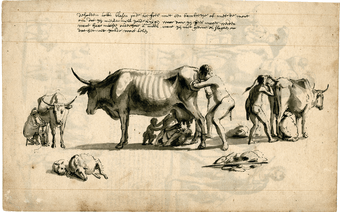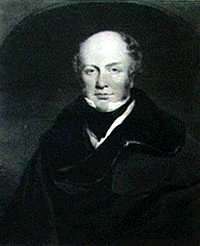Hottentot Proclamation
The Hottentot Proclamation, also known as the Hottentot Code, the Caledon Proclamation, or the Caledon Code, was the first of a series of laws that sought to restrict the rights of the Khoikhoi in Cape Colony.[1] The decree was passed on 1 November 1809 by the Earl of Caledon as part of the longstanding process to enslave the indigenous KhoiKhoi people on their own land.[2] It was established to help Afrikaner farmers control the mobility of the labour force. "Hottentot" was the term used then for the KhoiKhoi people.[3]
Slavery

The Caledon Code was implemented during a time when the British public was openly against slavery and after parliament had abolished the slave trade.[4] It was thus crucial that its application seem different from the previous slave laws. Written contracts had to be registered documenting the employment of Khoikhoi servants[4] for periods of one month or longer.[3] It also claimed to provide a safeguard against their ill treatment, [4] making it compulsory that they were paid for any services that they provided.[3]
According to the Apprenticeship of Servants Proclamation of 1812, in support of the Hottentot Proclamation, white settlers could apprentice and employ a Coloured child without paying them from the age of eight to eighteen years if the child was an orphan, destitute or grew up on the employer's property.[3]
Implementation

Earl of Caledon imposed The Caledon Code in his capacity as the first Governor of the Cape Colony after occupation by Britain in 1806.[2] The eastern and north-eastern districts of the Cape Colony were most affected by the declaration since most of the KhoiKhoi population was based in these areas.[2]
It stated that the KhoiKhoi were to have a “fixed place of abode” and that they could not travel freely, requiring a passport if they were found outside of their stipulated area. This prevented them from moving away from farms in which they worked as slaves unless their passes were signed by their employer. If asked to produce a pass by a white settler, they were to present the document verifying that they had permission from their employer to be away from home.[2]
Repeal
Led by Dr John Philip, who continually worked against the discriminatory treatment of indigenous South Africans, British missionaries protested the Hottentot Proclamation. Even while he was back in Britain, from 1826 to 1828, Philip fought for the emancipation of tribes in the Cape.[4] Ordinance No. 50 of 1828 banned incoming British settlers from buying slaves, repealing the proclamation in that year. This freed the Coloured slaves while from the pass system while Black people were still enslaved in accordance to the Ordinance No. 49 of 1828 which still issued them passes for the sole purpose of seeking work.[3]
All the slaves living in British colonies were to be freed after serving what is described as a period of apprenticeship, which only ended in 1838 in the Cape Colony.[4]
The repeal of the code would later set the stage for the abolition of slavery in all parts of the British empire via the Emancipation Act of 1833.[4]
References
- "1809. 'Hottentot Proclamation' - The O'Malley Archives". www.nelsonmandela.org. Retrieved 2016-05-08.
- Dooling, W. 2005. The Origins and aftermath of the Cape Colony's 'Hottentot Code' of 1809. Kronos. pp 50-61.
- Glücksmann, R. 2010. II. Racial Legislation from 1806 to 1910 in “Apartheid Legislation in South Africa. 2010.”
- History of the British Empire. Accessed 9 July 2017.